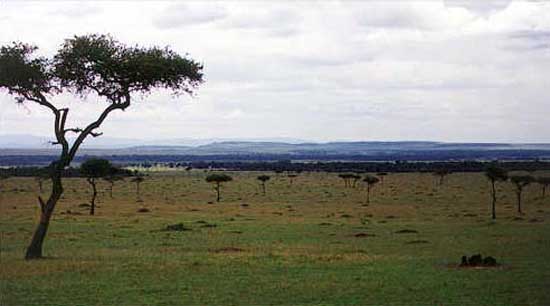
Luke Davenport of Hingham is a Peace Corps volunteer in Kenya working in a small village doing "small enterprise development" work. He shares his experiences with Journal readers from time to time.
Climate, history, business - are all fascinating in Africa
By Luke Davenport/ Letter from Kenya
Thursday, September 9, 2004
As much as this drives me nuts, and certainly always will, on a human level I can completely understand it. It is as if an elephant walked through downtown Hingham. It is so rare, so unusual, that it cannot but be commented on.
Living here in Mabanda has its ups and downs. We are in the midst of a serious drought. The rains usually last until the middle of June, but this year ended at the end of April. Water is a problem for almost everyone. My water problems are pretty minor actually - all I have to do is go down to the bore-hole on my compound and fill a couple jerry cans with water and I'm set for the day. For a lot of people there is no choice but to walk down a steep hill and fill up a jerry can from the river, then walk it back up the hill, then repeat this process over and over.
Much worse, of course, is the lost maize crop. Literally an entire six months crop totally failed to grow. This means more people have to buy their maize rather than eating their own, and at prices double the usual price. Now it's August, and people are already starting to go hungry. The worst part of it is that it will be at least until November until the rains start again, and March when, assuming the rains actually do start, they will harvest again.
The only problem with traveling in Kenya, and I think probably just about anywhere in Africa, is that you cannot see the place as it is. It reminds me of that particle theory from science, the one that says about quarks or some particle even smaller than atoms, that the actual act of looking at them changes them. It is difficult to understand some basic things about daily life here because your very presence changes them.
People often stop what they are doing when you pass, and will discuss your presence among themselves right in front of your face. If you visit, they will make a big deal of it, offering you tea and food. Hospitality is a big part of their culture anyway, but being foreign there is a tendency to make an even bigger deal of it, or at least I think... Right now I'm reading a book about the Mau Mau rebellion and they are describing some whites who would dress as blacks to infiltrate the Mau Maus. Since many of them were born and raised there, they were fluent in Kikuyu, and with sufficient wigs and skin paint or makeup or something they could supposedly pass as African. I sometimes wonder what it would be like to do something like that. To be treated as a fellow African, not as a special guest, a foreigner.
Language
The more I understand of the Kikuyu language the more I realize just how much I'm talked about right in front of my face. Today I heard one guy say, "where does he want to go?" and the guy responded "Kirwara" (which was true). If two Kenyans are along the road, and I pass by, even if they don't know each other at all, they will often say something about it. Nothing negative, nothing sinister-just comment.
The fact of my difference is not a taboo subject, as we might try to make it in the States, but a totally acceptable topic of conversation. As much as this drives me nuts, and certainly always will, on a human level I can completely understand it. It is as if an elephant walked through downtown Hingham. It is so rare, so unusual, that it cannot but be commented on.
In fact here it is even acceptable to call someone by their identity, especially if you don't know their name. Hence, people yell out "Mzungu" (white person) when I pass. This aggravates me to no end but as someone pointed out to me, it is totally acceptable here. If you are a teacher, people will often call you "Mwalimu" (teacher). If you are a "Jua Kali" person (someone who builds stuff outside in the "hot sun") you can call them "Jua Kali!"
The simple fact is there isn't much sensitivity about identity here- there's no reason to, since nearly everyone in the area is of the same ethnicity. As a white person, your obvious distinctive characteristic is your whiteness, so that is how you are identified to the passing stranger.
To give you a sense of how my presence changes things: before I even arrived to where the group was supposed to meet today, I was intercepted by one of the members of the group, who told me the group wasn't in fact meeting. I can't say for sure, but I'm pretty sure she literally heard that I was coming from the time I started walking, in a straight line, to where she was. Meaning the word actually spread faster than I could walk there. I've had things like this happen before, where someone I was looking for will have come out of their compound to greet me before they possibly could have seen I was coming. Magic? I don't know. More likely children with quick feet and loud mouths.
Old and young
One of the big problems I see in this area is a huge generation gap between the old and the young. The young kids want to dress in a western urban style, listen to American and Kenyan hip-hop, and watch WWF wrestling. They see everything in Kenya as inferior to things in the west. Sadly, this inferiority complex runs deep. It comes from what people see on TV about the west, what they hear from Kenyans in the States and Europe, and even from what they were told during the days of colonialists and missionaries. It's too bad - the culture is so interesting, so unique. But it is dying a slow death, and what replaces it is unclear. There are things about the language, customs, the experiences of the Mau Mau that will be soon lost when the old folks pass on.
A while ago we had a couple elderly women come by the office - mostly just to escape the rain that had been falling. I asked them a few questions about what Mabanda was like in the old days, and we agreed they would come back and tell me their life stories the next day. So they came, we went and sat down on some benches outside and she proceeded to tell me some amazing things about the Mau Mau. Many of the very old women here have large holes in their ears, which I had been told was the result of a no longer practiced custom of putting huge earrings in Kikuyu girls' ears. What I didn't know was that if the holes are up high on the lobe, as they were for this old woman, it means something different.
Those holes were cut during adulthood as part of an oath they took committing themselves to the cause of driving out the white man. She went on to tell me about all the various forms of torture they could be subjected to by the white-sympathizing Home Guards, the Mau Mau fighters, and the whites themselves.
She told us about some of the places -places I pass every day - where people were buried, where battles happened, and where Mau Mau fighters hid out. Hearing these things has made me look at these old folks in a totally different way. It's tempting to think life has barely changed here in all that time, but in fact nothing could be further from the truth. Any hunched over old lady or old man you see around - and there are many - has witnessed and been a part of things unimaginable today. And for the most part, their stories go completely unheard.
I recently took a weekend trip to visit another volunteer in a town called Meru, east of Mt. Kenya. There isn't much in Kenya that's not interesting, and the trip to Meru is no exception. There's one area, called Mwea, where almost all the rice in Kenya is produced. In town after town, women spread their harvested rice over huge plastic tarps that cover the entire area beside the road. There is so little room to move that people routinely walk over the rice, and even ride bicycles over it. There are hundreds of stores selling only rice.
Sheep are raised
There are some other areas in Kenya that are well known for producing one item. On one of my first days in Kenya I traveled from Nairobi to Naivasha. This road passes through a place called Kinangop. For a stretch of about five miles there is a roadside stand selling wool sweaters and hats about every hundred yards. At first I thought this was some plain bad business practice, but what I found out was that Kinangop is one of the only places in Kenya where sheep are raised. Hence, wool is abundant. Transportation is so costly, relative to labor or anything else in the country that despite having to directly compete with possibly hundreds of people making and selling the exact same thing, most of these people do better selling the sweaters one by one themselves than selling on bulk to a distributor or middleman. Likewise, if you want a wool sweater, your best bet is to wait until the next time you pass that way and buy one then.
There's a place along the road just north of Thika where probably 20 guys sell identical reed mats - I guess they grow reed there. You want a reed mat? Go there.
Along the road to Meru there's an old rusty sign with an outline of Africa and the words "this sign is on the equator". That's all. Welcome to the Northern Hemisphere. Crossing the equator seems to me like it should be more of a big deal than crossing a state line or a time zone - after all it divides the world in half. It at least deserves a bright shiny sign, not one that hasn't been touched in 50 years, as if it was for a long out of business gas station. I couldn't help but picture what the place would look like if it were in the States. A Four-Corners-esque souvenir selling spot, a rotating restaurant with families spending their lunchtime going back and forth between the hemispheres, maybe lots of little stores selling "Take Me to the Equator!" key chains?
One of the distinctive features about Meru is the miraa trade that goes on in Meru. Miraa, also known as khat, is a mildly narcotic plant that a lot of men in Meru chew incessantly. It's similar to chewing coco leaves, the way South American coco farmers do. If you read "Black Hawk Down," you might remember the description of the Somali fighters, nervous and fidgety from the khat they chew all day. It's the same stuff and in fact a lot of it comes from Meru.
The miraa trade is big business. A truck full goes for about $20,000 I'm told. The stuff goes bad very fast, and Meru is far from Nairobi, so the trade works on speed. Pickup trucks carrying it fly down the Meru road, a twisty turny hilly road, at incredible speeds. They have points along the road where they deliver parts of their load. They don't stop - they throw the packs onto the side of the road from the moving truck and collect the money later. The trucks are notorious for having lots of accidents. I've been told if one has an accident they load the miraa onto a new truck immediately and it's on its way - even before they deal with the dead or injured driver and passengers. A lot of people are pushing the government to force these trucks to have speed governors too, like the matatus, but it hasn't happened yet.
Luke Davenport of Hingham is a Peace Corps volunteer in Kenya working in a small village doing "small enterprise development" work. He shares his experiences with Journal readers from time to time.



